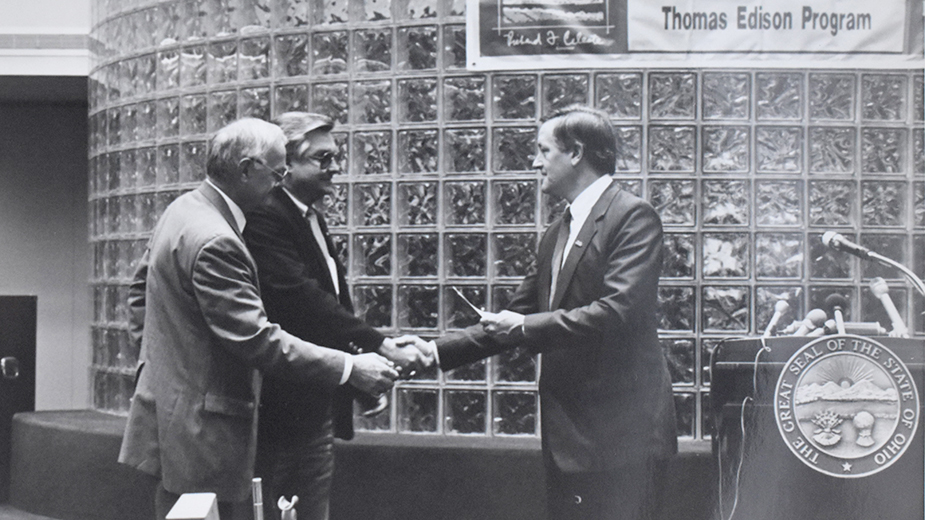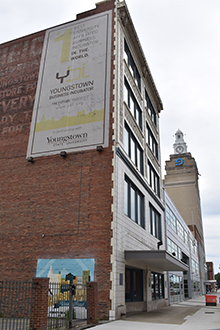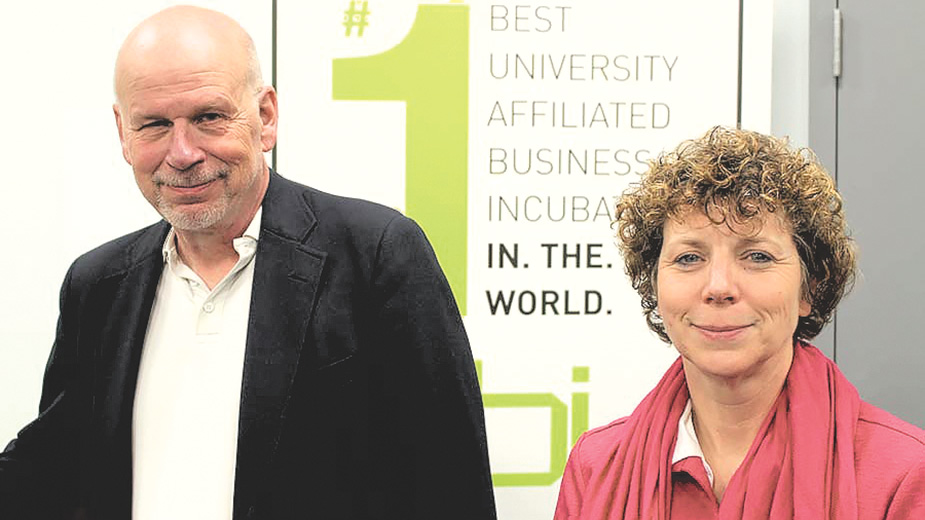YOUNGSTOWN, Ohio – What started in the mid-1980s as an initiative to assist entrepreneurs in the Mahoning Valley is now an internationally recognized business incubator that encompasses five buildings – with plans to expand to a sixth – and hosts the first national manufacturing hub created by the Obama administration.
The roots of the Youngstown Business Incubator extend to fall 1986, when Gov. Dick Celeste presented a $283,000 check to establish Ohio’s sixth Edison Office of Entrepreneurship at Youngstown State University.
The office would work with entrepreneurs and businesspeople at three locations, including a small-business incubator in East Palestine, according to our November 1986 edition. The purpose of the Edison office was to assist small, technology-oriented businesses and displaced workers with retraining to start their own companies.
“Some may grow to be the great industries of the future. But these small businesses are the key to a dynamic economy here in the Mahoning Valley and across our state,” Celeste said.
Not being based in its own incubator distinguished the local Edison office from both Edison-funded technology centers and the business incubators that normally housed them, said Jeff Hallett, the executive director of the local office. It served as a funding agency for tech-related activities at other incubators.

“It makes us unique,” he said in a MidMarch 1988 story. “We can fund a portion of several incubators rather than setting up one incubator that is totally technology based.”
This “incubator without walls” concept would not last long.
In the late 1980s and early 1990s, plans were afoot to establish a physical incubation space in downtown Youngstown. Donald Caiazza, chairman of the Youngstown Edison board, reported in a MidApril 1990 front-page story that he was working with the Mahoning Valley Economic Development Corp. and venture capital group MidAmerican Resource Corp. to secure startup funds.
State Edison officials “very much want to continue to be part of funding in the Youngstown area. But it’s up to the locals to get the thing up and filled with tenants,” Caiazza said.
In August 1990, we reported that rehabilitation was expected to get under- way in two months on a downtown Youngstown building – likely to be the former Furnitureland on West Federal Street – that would house a “mixed use” small-business incubator. Supported in part by a $300,000 Ohio Department of Development grant, the incubator would house some tech-oriented businesses but also service and retail companies and would not function as a formal Edison Program incubator.
In October 1991, we reported that the Furnitureland property was being donated by the Vindicator Printing Co. subsidiary that owned it. The cost to rehabilitate the building into incubator space was estimated at $1.2 million.
The story noted that officials with the Youngstown Edison Incubator Corp. had secured another $400,000 from ODOD, plus a $100,000 energy conservation grant with $70,000 remaining from the 1986 grant. Local leaders also were applying for more funds from the state and the U.S. Economic Development Administration, from which it was seeking $700,000.

Arnie Clebone, YEIC vice chairman, acknowledged the process of establishing the incubator had taken “longer than expected.” EDA officials had objected to initial plans to lease the building from the Vindicator subsidiary.
It wasn’t until Oct. 6, 1994, that Gov. George Voinovich would participate in a ceremony to lay the cornerstone at the incubator’s new home.
“Youngstown is an ideal location [for the incubator] because growth and expansion have gained tremendous momentum in this part of the state,” he said. “I always refer to Youngstown as truly Ohio’s comeback city of the ’90s.”
As the April 1995 Business Journal was going to press, the incubator corporation was finishing the renovation in preparation for opening for business. The incubator was to have 16 suites available for immediate occupancy, according to its director, Gail Wright.
By May 1997, the incubator had seven client companies with five moved in, Wright said.
The number of tenants had grown to nine by January 1998, including seven startups. Of the space made available by the building’s original renovation, just over 90% was occupied.
Jim Cossler, who had replaced Wright as YBI director, said he was “thrilled” with the incubator’s growth. “Not only are we meeting our mission of creating new employment opportunities for the community, but the tremendous financial investment we have made in our properties and the new companies we are creating here have made a significant contribution to the ongoing revitalization of the central business district,” he said.
Meantime, YBI was planning to expand to a building on West Boardman Street that was connected by an enclosed pedestrian bridge over Dutton’s Alley. Cossler was reaching out to public and private sources for help with the project, which would provide an additional 19,000 square feet.
In April 1998, The Business Journal reported that the $830,000 renovation would start in October and provide space for another 18 companies.
In its annual report, released in September 2001, YBI reported that eight firms were housed in the incubator and produced 10 new products. Incubator companies also submitted applications for seven patents and had combined sales of $3.9 million, generating $2.4 million in payroll and employing 89 people.
Under Cossler, who previously had worked for the Youngstown/Warren Regional Chamber and the Better Business Bureau, the incubator undertook a greater focus on business-to-business software. Our MidSeptember 2001 edition reported that YBI tenant Perkins Communications had developed a “fully convergent entertainment system designed to transform hotel television screens into a window on the world.”
In 2002, when Turning Technologies started operations at YBI, the incubator’s success story in an old steel town started to be told nationally.
Turning Technologies developed audience response technology for business and education applications. Turning grew from a handful of employees to 135 in 2008, the year it moved into YBI’s newly built Taft Technology Center on West Federal Street.
The year before, Inc. magazine had recognized Turning Technologies as the fastest-growing, privately held technology company in the country, with sales growth of nearly 4,000% over four years.
Former Gov. Bob Taft returned to Youngstown on May 19, 2008, for the dedication of the building named for him, about two weeks after Turning had moved there.
“We’re more of an accelerator rather than an incubator,” Gary Mrozek, YBI board chairman, said. He credited incubator tenants with contributing to the creation of 250 jobs and 17 patents.
At this point, YBI was working with the Youngstown Central Area Community Improvement Corp., which helped to develop the Taft building, to convert the neighboring Semple Building – which it acquired in 2009 – into space for technology-based companies.
As its reputation and that of its companies grew, so did national – and even international – interest in the incubator.
Our July 2010 story reported on a visit by the British Broadcasting Corp., which was “doing a series on BBC America talking about world-class innovation coming from places that you wouldn’t expect it to come from,” said Cossler – now YBI CEO and self-styled “chief evangelist.”
ADDITIVE MANUFACTURING
Joining YBI was one of the opportunities that Barb Ewing was considering when she decided to leave U.S. Rep. Tim Ryan’s office after Republicans took control of the U.S. House of Representatives in the 2010 election. “There was a world of possibly there,” she said during a recent interview.
Ewing had worked with Cossler previously at the Regional Chamber and BBB.
Her arrival at YBI in 2011 triggered a rethinking of its approach.
Cossler believed passionately that doing one thing “in a world-class way” was the best approach to take and focused YBI on B2B software, she recalls. Although he was proven right, it was an approach that didn’t “feel sustainable” to her or to the board.
“It also didn’t feel like we were going to be able to reach out to the larger segments of our communities, especially the manufacturing community,” she reflects. That led to looking for ways to connect with local manufacturing.
Soon, it became apparent what would go into the former Furnitureland warehouse at 236 W. Boardman St.
On Aug. 16, 2012, the Obama administration announced the creation of the National Additive Manufacturing Innovation Institute. The new public-private partnership, which would serve as a pilot for similar institutes focused on manufacturing technology, would be situated there.
It was a $70 million project, pitched in a regional proposal that beat out a dozen others, including proposals linked to major research universities such as the Massachusetts Institute of Technology.
“The potential of additive manufacturing for transforming business within almost every industry is huge,” said Rebecca Blank, acting U.S. commerce secretary. She was among senior Obama administration officials who participated in the announcement at M-7 Technologies.
Barely a month later, Sept. 27, 2012, NAMII – which would rebrand roughly a year later as America Makes – would open its doors.
“The technology has the capability of revolutionizing the way we make things,” Ralph Resnick, acting director, said. “It’s essentially growing parts versus subtracting material to make parts.”
The center would draw widespread attention – not insignificantly from the president himself during his State of the Union address.
“Last year we created our first manufacturing innovation institute in Youngstown, Ohio. A once-shuttered warehouse is now a state-of-the-art lab where new workers are mastering the 3D printing that has the potential to revolutionize the way we make almost everything,” Obama said Feb. 12, 2013.
The presidential shoutout encouraged news coverage of the YBI-based institute, including by NPR and Inc. Obama drew additional attention to the Youngstown hub by mentioning it in the following year’s State of the Union Address.
On Sept. 16, 2014, the Stockholm-based University Business Incubator Index ranked YBI as the No. 1 university-affiliated incubator in the world.
“The one thing that I really hope this award does is put the nail in the coffin of the disbelief that has sometimes held this community back,” Cossler said. “It puts in the mind of everyone – every one of the portfolio companies, in the arts organizations, in the education organizations – that you can do it here.”
The incubator would continue to attract a variety of tenants, and the need grew for space to house them – particularly additive manufacturing companies. In 2015, this led YBI to acquire Vindicator Printing’s former office building, 29 Vindicator Square, for $654,000. Renovation of the building to accommodate its new use was estimated at $6 million. EDA had awarded YBI a $3 million grant for the project. EDA’s administrator, former Youngstown Mayor Jay Williams, then an assistant secretary of the U.S. Department of Commerce, came home to present the ceremonial check.
Over the years, YBI also began assisting specific categories of startups through its Women in Entrepreneurship program. Its success stories include Carmella Marie, a hair care products manufacturer launched by Carmella Williams, who won a $5,000 grant from its WE Launch program in May 2016.
“That was something that Jim was very supportive of,” Ewing says. “He’s a tremendous advocate for giving people a hand up.” She believes that program also was a factor in YBI being designated as the local Ohio Minority Business Assistance Center in 2018.
The winner of the fall 2016 WE Launch program, winemaker Marisa Sergi, landed a product tryout with retail giant Walmart in June 2017. In the years since, Sergi’s L’uva Bella Winery has been distributed through Walmart in several states and through other national retailers as well.
In 2017, Cossler officially designated Ewing as his successor, a transition that became official May 1. “She is going to take us to heights we never imagined,” he said. “Much of what we have accomplished in these last six years has been under Barb’s leadership.”
Cossler would remain Huntington Bank Entrepreneur in Residence, allowing Ewing to focus on administrative work and him to work hands-on with companies. He retired in 2021.
Later in 2017, YBI added a program to support social entrepreneurship and closed the year by debuting the renovated Vindicator building, now designated Tech Block Building No. 5.
One of the building’s first tenants was Strangpresse LLC, which manufactures extruders for the additive manufacturing industry.
In February 2018, YBI and YSU announced the launch of a partnership with PrintSYSt, the developer of an artificial intelligence application aimed to ease adoption of 3D printing technology.
By year’s end, Ewing reported that YBI supported 75 technology-based startup clients in an 18-county region, with more than $43 million in revenue generated and $49 million raised in investments during the previous four months.
RECENT HISTORY
YBI hosted its first Shark Tank event in May 2019. It was won by Augment Therapy, which combines telehealth capability and augmented reality experiences to improve the delivery of pediatric physical therapy. Augment would subsequently report that it had raised $375,000 as a result of the event.
On the downside, 2019 begin with the Jan. 2 announcement that Turning Technologies had been acquired by the venture capital firm Centre Lane Partners. In a news release, the new owner pledged to keep the company based in Youngstown. For a while, it did – but not for long. The company was absorbed by Echo360, a New York-based producer of interactive learning and assessment platforms used worldwide.
One of the unexpected developments in YBI history was the June 2022 announcement that Steelite International, global supplier of tableware to the hospitality industry, intended to move its corporate headquarters from New Castle, Pa., to the Taft Technology Center. A few months later, in September, Gov. Mike DeWine came to town to announce a $475,000 JobsOhio grant to fund the final phase of renovations at Tech Block Building No. 5.
In January of this year, Ewing announced plans for an expansion into the 107 Vindicator Square building where the newspaper’s editorial, sales and printing facilities were based until its closing in 2019. She also reported renovations would occur at Tech Block Building No. 5. and at the main YBI building, 241 W. Federal St., which hadn’t seen much more than cosmetic upgrades since the 1990s.
“It’s just a rethinking of the entire building to make the space more functional and allow us to maximize it because it’s pretty well full at this point, too,” Ewing said Jan. 27.
YBI wants the former Vindicator building for a potential defense and aerospace innovation hub that would use additive manufacturing applications. Two of its tenant companies need additional space, according to Ewing. Getting approval of the innovation hub funding request would provide not only more physical space “but also the program resources to really home in on defense and aerospace industries that would have applications for additive manufacturing,” she says.
“We could truly put a stake in the ground and say this is where we can help local manufacturers get into supply chains for the military, and where we can start to create new technologies around defense and aerospace technologies.”
Today YBI has 31 tenant companies and 60 portfolio companies. It is working on a new strategic plan, collecting as much information from the community as possible to “to make sure that our vision aligns with the rest of the community’s goals,” Ewing says.
Even as it ventures into new areas such as drone technology, which has “lots of business-related applications,” YBI will continue to support software, advanced manufacturing, health care and other companies that it has traditionally assisted.
“We’re just looking at what makes the most sense for us,” Ewing says.
Pictured at top: Jim Cossler became CEO of the YBI in 1998. Barb Ewing became CEO in 2017.

